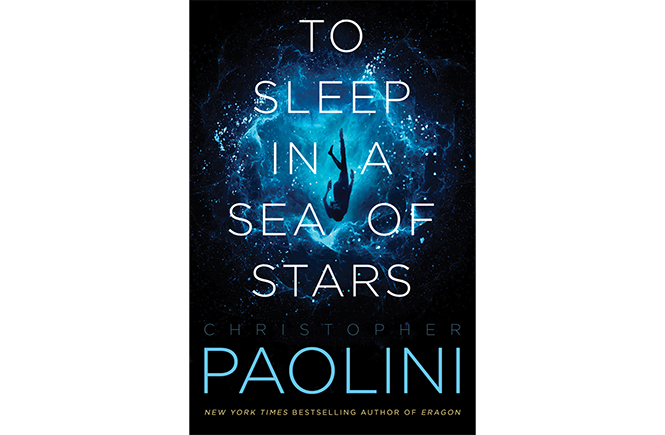To Go Where He's Never Gone Before
Eragon author Christopher Paolini takes his world-building from fantasy to science-fiction.
By Scott Renshaw @scottrenshawAt the age of 19—when most of us are still barely figuring out what we want to be when we grow up—Christopher Paolini had a New York Times bestselling novel. Now, at the wise "old" age of 36, he's taking his first steps outside the genre that established his career.
Eragon, published in 2002, launched a fantasy universe that has thus far included three additional novels (the Inheritance Cycle), a collection of short stories and a feature film adaptation. Paolini's new novel, To Sleep in a Sea of Stars, marks a shift to "hard" science-fiction, telling a story of a distant future where humans have colonized other star systems, and where a biologist's discovery of a symbiotic alien life form immerses her in a massive interstellar conflict between alien races. Paolini will be participating in a virtual conversation with author Brandon Sanderson about the book in a live event via kingsenglish.com on Sept. 25 at 7 p.m.
Having established himself for nearly two decades in the fantasy field, it would have been easy for Paolini to continue along that successful path. But for him, To Sleep in a Sea of Stars was a necessary next step. "Part of it was just to prove I could," he says by phone from his Montana home. "The rest of it was, I wanted to show you could write science-fiction with an almost mythological feel while still being realistic. This is still an epic.
"We had a nice collection of both [fantasy and science-fiction books] growing up," he adds. "Fantasy captured my heart, but science-fiction captured my intellect and my imagination."
To Sleep in a Sea of Stars allowed Paolini to pay his respects to some of his favorite genre works—there are more than a couple references to the Alien films—yet it also proved to be a unique challenge. Researching the science behind concepts like faster-than-light travel and genetic enhancements took most of a year, a necessary part of science-fiction "world-building" that isn't quite the same in a setting based on magic and fanciful creatures. "I couldn't just ignore physics as we know it," Paolini says. "I could amend it, say we could make more discoveries in the future. ... What I really enjoyed was that, by trying to answer those sort of annoying questions that are easy to hand-wave away, it leads in interesting directions."
Paolini acknowledges that the mental effort involved in getting the science right might have contributed to why it took him nearly a decade of writing and re-writing To Sleep in a Sea of Stars to finally crack the narrative in a way that felt right. Yet part of this new challenge was also the evolution from writing a coming-of-age story focused on a young protagonist to one with a grown woman as its hero. "Adult lives have a different structure than adolescent lives, and vary a lot from one life to the next," Paolini says. "The shape of the story for an adult is different from the shape of a story for an adolescent. World-building is fun, but finding the emotional heart is harder."
The author himself has moved from adolescence to adulthood over the course of his professional career, and he notes that there were certainly pluses and minuses to finding success at such a young age. "It completely transformed my life from being a home-schooled kid in Montana to being able to travel the world—not to mention making a living as a storyteller," Paolini says of Eragon's success. "I'm still kind of amazed that I get to do this. The downside was growing up in this process. It led to some ... unusual experiences, let's say. Now that I'm older, I sort of shake my head and say, 'Wow, I didn't understand how strange and unusual this is.'"
Paolini also says that, while for every writer it can be strange looking back on early work from the perspective of being older and more experienced, he's able to see the books he wrote as a teenager and young adult in all their flaws and highlights. "Sometimes I'll have to look something up," he says, "and open up Eragon and I'm pleasantly surprised: 'Hey, I wrote that!" And other times I look and groan, 'I wrote that?' I've been doing this for about 22 years, so I'd hope I've learned a few things."
Still, as he makes this journey into the previously unknown space of science-fiction, he's appreciative for what Eragon and the Inheritance Cycle have given to him, and to the fans who he hopes will follow him on this adventure from his previous fantastical worlds into the distant reaches of space. "There's a reason why the publisher chose my name and not the title to emphasize on the spine," he says of To Sleep in a Sea of Stars. "For better or worse, readers are still getting 'a Paolini.'"
Christopher Paolini: To Sleep in a Sea of Stars
KingsEnglish.com virtual author appearance
Sept. 25, 7 p.m.
$38, registration includes book
crowdcast.io/e/christopher-paolini--to/register
More by Scott Renshaw
-
Film Reviews: New Releases for April 12
Civil War, Escape from Germany, Coup de Chance, Hundreds of Beavers, La Chimera, Sting
- Apr 11, 2024
-
University of Utah School of Music premiere of A.L.I.C.E.
Composer connects the Lewis Carroll story to her experience living with autism
- Apr 10, 2024
-
Beavers and Spiders and Thieves, Oh My
Three new films cover a wide range of styles.
- Apr 10, 2024
- More »
Latest in Arts & Entertainment
Readers also liked…
-
New TV for January 2023
Mayfair Witches, Velma, The Last of Us, Poker Face and more premieres
- Jan 4, 2023





